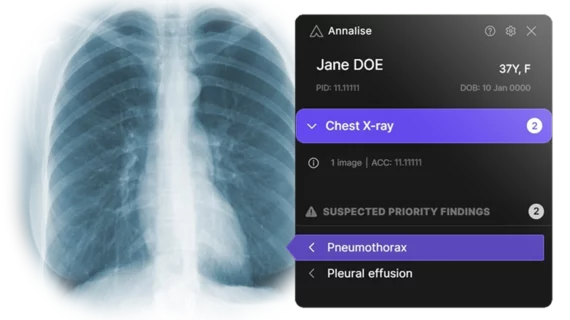AI-powered radiology triage tech prioritizes image review based on patient need
Medical imaging company Annalise.ai announced the introduction of a new AI triage tool that automatically analyzes radiology reports and prioritizes their review based on the potential for containing critical findings.
According to an announcement from the company, Annalise Triage provides radiologists with tools to efficiently analyze triage studies, employing AI-generated work lists that expedite critical cases automatically, leading to faster diagnoses for urgent medical conditions. The company says this will reduce the need for manual sorting, saving radiologists additional time by flagging potential concerns in images.
Annalise Triage is not only cleared for use in clinical settings by the U.S. Food and Drug Administration, but it utilizes AI that has been granted a “breakthrough designation” by the regulatory agency—a status granted to innovations that demonstrate their clinical value by significantly enhancing the diagnosis or treatment of life-threatening conditions.
Annalise says its technology is the only triage solution of its type to receive the designation, which it earned for the improved identification of obstructive hydrocephalus.
“Our advanced algorithms support radiologists by facilitating prioritization of studies with suspected critical findings, thereby optimizing radiology workflow,” Rick Abramson, MD, chief medical officer at Annalise.ai, said in the same statement. “With its set of clearances, Annalise.ai promotes faster report turnaround times by identifying and elevating critical cases for immediate attention.”
The company says Annalise Triage is cleared to make 12 clinical findings as part of its AI-powered workflow prioritization of radiology reports, making it one of the most comprehensive tools for CXR and noncontrast CTB on the market in the U.S. Health Imaging previously reported that the technology has been shown in clinical studies to be effective at helping radiologists to interpret noncontrast CT scans.

